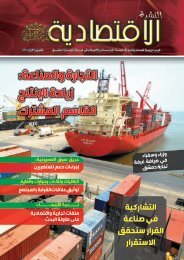SIGAR
2017-01-30qr
2017-01-30qr
Create successful ePaper yourself
Turn your PDF publications into a flip-book with our unique Google optimized e-Paper software.
COUNTERNARCOTICS<br />
Community Based Agriculture and Rural Development<br />
INL’s other alternative-livelihood project—the Community-Based<br />
Agriculture and Rural Development (CBARD) project—aims to improve<br />
household income while reducing dependency on illicit poppy cultivation<br />
for selected communities in Farah and Badghis Provinces, the second and<br />
third highest poppy-cultivating provinces in western Afghanistan in 2015,<br />
according to UNODC. 855<br />
According to INL, CBARD will improve the local production and marketing<br />
of high-value crops. The project will also develop and strengthen<br />
community-based business infrastructures, such as irrigation, transportation,<br />
and facilities. The $15.2 million program is implemented by UNDP with<br />
additional monitoring and evaluation conducted by UNODC. The project<br />
has a 44-month period of performance and is scheduled to end in 2020. 856<br />
The first six months are defined as the project inception phase, to be followed<br />
by three years of project implementation. The inception phase will<br />
be dedicated to staff recruiting and building consensus among stakeholders<br />
regarding project objectives. 857<br />
INL informed <strong>SIGAR</strong> that all project funds have been disbursed:<br />
$14.6 million were transferred to UNDP and $570,000 to UNODC. 858<br />
Kandahar Food Zone<br />
Implemented in 2013, the Kandahar Food Zone (KFZ) is a five-year,<br />
$45.4 million USAID project, implemented by International Relief and<br />
Development Inc. (IRD) under a joint strategy and in close coordination<br />
with INL. 859 KFZ is designed to identify and address the drivers of poppy<br />
cultivation in targeted districts of Kandahar Province through grants for<br />
activities that improve community infrastructure, strengthen alternative<br />
livelihoods, and support small businesses.<br />
The Ministry of Counter Narcotics’ KFZ has four pillars: public outreach,<br />
eradication, drug-demand reduction, and alternative livelihoods. 860<br />
USAID implements the alternative-livelihoods pillar and approved a twoyear<br />
extension last August, extending the program through the end of<br />
August 2018. 861<br />
KFZ expended $9.7 million between July and October 2016. During the<br />
program’s second year, KFZ renovated more than 168 kilometers of 12<br />
canals in two districts and implemented alternative-development activities<br />
such as vineyard trellising, solar drying, greenhouse installation and<br />
management, and vocational training. During its third year, ending on<br />
September 30, 2016, KFZ renovated 50.5 kilometers of five canals, trained<br />
people responsible for distributing water to farms and canal tributaries in<br />
canal maintenance, and introduced vineyard trellising and intercropping.<br />
KFZ also developed a management-information system that combines<br />
a geographic information system (GIS) with field inspection and survey<br />
data. Several Afghan ministries want to use this system to monitor field<br />
RADP-South demonstration farm in Qalat,<br />
Zabul Province. (USAID photo)<br />
Intercropping: growing two or more<br />
crops simultaneously on the same field.<br />
Crop intensification is in both time and<br />
space dimensions.<br />
Source: Food and Agriculture Organization of the United Nations<br />
Website, accessed 1/3/2017.<br />
REPORT TO THE UNITED STATES CONGRESS I JANUARY 30, 2017<br />
195







